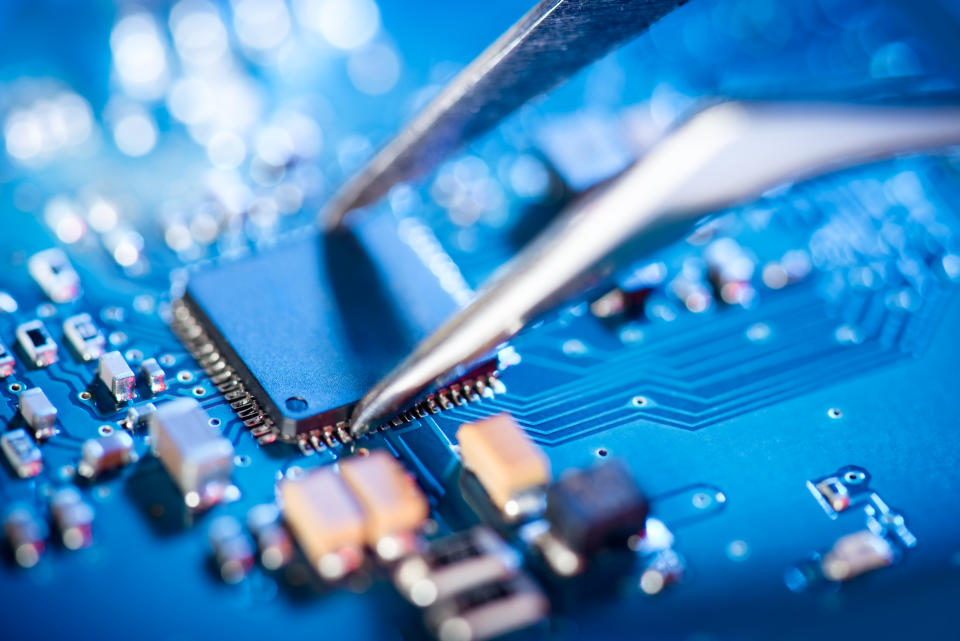Japanese chipmaker Kioxia delays IPO amid US-China tensions

The world’s second-largest maker of NAND flash memory chips, Kioxia is considering delaying Japan’s biggest initial public offering (IPO) as tensions between the United States and China ramp up.
Earlier this month, the company which spun out of Toshiba Corp (TOSBF) in 2018, set a tentative price range for an IPO in Tokyo to raise as much as $2.9bn (£2.3bn).
Toshiba has retained roughly 40% of Xioxia, with the rest held by a group of Japanese, US and South Korean investors.
The Japanese chipmaker was due to reveal its final pricing on Monday, instead Xioxia’s board is reportedly meeting on Monday to discuss its options, according to the Financial Times.
Kioxia had planned to list on the Tokyo Stock Exchange (JPXGY) on 6 October, at a valuation of more than $14bn. The company warned tighter restrictions could cause memory chip oversupply and drive down market prices.
The company was previously caught in the crosshairs of the US-Sino trade war after Trump imposed tighter restrictions on its client Huawei. Trump’s move sent Huawei’s relations with other countries in a downward spiral, including with the UK, which has banned the Chinese company from building its 5G network.
On Friday, the US commerce department imposed sanctions on China’s biggest chipmaker Semiconductor Manufacturing International Corporation (SMIC), warning exporters that there is an “unacceptable risk” equipment supplied to SMIC could be used for military purposes.
The export controls require suppliers of certain SMIC equipment, to apply for individual export licences.
SMIC (SMICY), a key producer of components used in smartphones and other devices, has denied receiving any formal notices from the US government, and it has also rejected it has ties with the Chinese military.
READ MORE: China targets foreign firms on 'unreliable entities' list as US trade war intensifies
It comes after, China announced sweeping powers to curb trade, investment and operations of foreign firms deemed “unreliable” on a blacklist, in a retaliation against punitive US actions towards Chinese businesses, such as Huawei.
A move which upped the ante in China’s ongoing trade war with the Trump administration.
The blacklist, targets foreign firms and individuals violating normal market transactions in the country — interrupting deals with Chinese firms — or taking discriminatory measures against Chinese companies.
Firms that end up on the blacklist could be banned from investing in China or importing or exporting in China. Other actions, include entry restrictions on workers entering the country, revoking work or residence permits and imposing fines.
READ MORE: TikTok: Trump backs Oracle deal, delays app store ban
Additionally, a federal court judge is also due to begin hearings on Sunday to decided whether the US government’s order to ban TikTok from American app stores can go ahead.
The ban which was supposed to come into effect on 20 September, was delayed for a week on the condition the video-sharing app found a US buyer.
Last week, Trump gave his blessing for a deal TikTok-owner, ByteDance reached with Oracle (ORCL) and Walmart (WMT) for its US operations, in order to avoid being banned in America.
A judge in California, also blocked the commerce department from requiring Apple (AAPL) and Google, to remove Tencent-owned (TCEHY) WeChat, for downloads in their app stores, last week.
US magistrate judge Laurel Beeler said in an order that WeChat users who filed a lawsuit “have shown serious questions going to the merits of the First Amendment claim, the balance of hardships tips in the plaintiffs favour.”
The Trump administration has constantly accused Chinese apps TikTok and WeChat of breaching US national security laws by passing data on American users to the Chinese government. But, TikTok denies handing over US data to the Chinese authorities. China says Trump’s ban is political.

 Yahoo Finance
Yahoo Finance 